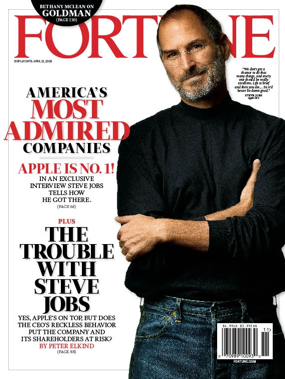 Once again, Steve Jobs is on the cover of Fortune magazine. He is there because Apple is the most admired company in America. No, wait. He is there because investigative reporter Peter Elkind wrote a 12-page takedown of his Steveness. It turns out both are true. Jobs is steering the most admired company in America and he is a “reckless” CEO whose “behavior put the company and its shareholders at risk.”
Once again, Steve Jobs is on the cover of Fortune magazine. He is there because Apple is the most admired company in America. No, wait. He is there because investigative reporter Peter Elkind wrote a 12-page takedown of his Steveness. It turns out both are true. Jobs is steering the most admired company in America and he is a “reckless” CEO whose “behavior put the company and its shareholders at risk.”
I am all for balanced reporting, but which one is it? Not to be completely cynical, but Apple is a big advertiser for many Time Inc. magazines. And I imagine that Jobs would have no compunction about threatening to pull all of Apple’s advertising to kill a story he did not like. In fact, he did just that at Business 2.0 after we ran a positive, but unauthorized, cover story in April, 2005 that showed an artist’s rendition of the iPhone before it was launched. Jobs did not like this story either. (He refused to talk to the writer. Pairing the story with another one on the cover that says “Apple is No. 1” does soften the blow. (Jobs had no problem talking to another Fortune writer for that interview, in which he reveals how great he is).
This isn’t the first business magazine to go negative on Apple. Fast Company laid out what could go wrong with Apple in its December cover story, but at least it focused on strategic and business pitfalls that could take everybody’s favorite company down. (It wasn’t very convincing either). The Fortune story is more personal about Jobs himself. It digs up a lot of dirt we’ve heard before about Jobs’ personal life, temper tantrums, and family history. You learn for instance that Jobs’ 76-year-old biological father, who put him up for adoption, now “works as food and beverage director at the Boomtown Hotel & Casino near Reno.”
The article also spends a lot of time on the options backdating scandals at both Apple and Pixar that came to light a couple years ago. Elkind paints a picture of the Apple board (and Pixar’s before that) letting Jobs get away with pretty much whatever he wants. Of course, we already knew that. (“Can I have a plane, guys?”). After months of investigating, the only important new revelation Elkind can come up with is that Jobs and Apple’s board hid his cancer from shareholders for nine months before disclosing it. Jobs explored special diets and alternative remedies before opting for surgery.
That’s pretty bad, right? The not disclosing part. Except that, if you read the article all the way through, near the end you find out:
When the CEO of a publicly traded corporation is diagnosed with a serious illness, what is his obligation to inform shareholders? There is no clear answer.
During the mid-1990s, for instance, Intel CEO Andy Grove did not disclose his own cancer for a year and nobody ever complained about that. Oh well, perhaps the trouble is not with Steve Jobs. It’s with the story.
(Full disclosure: I once worked at Fortune).